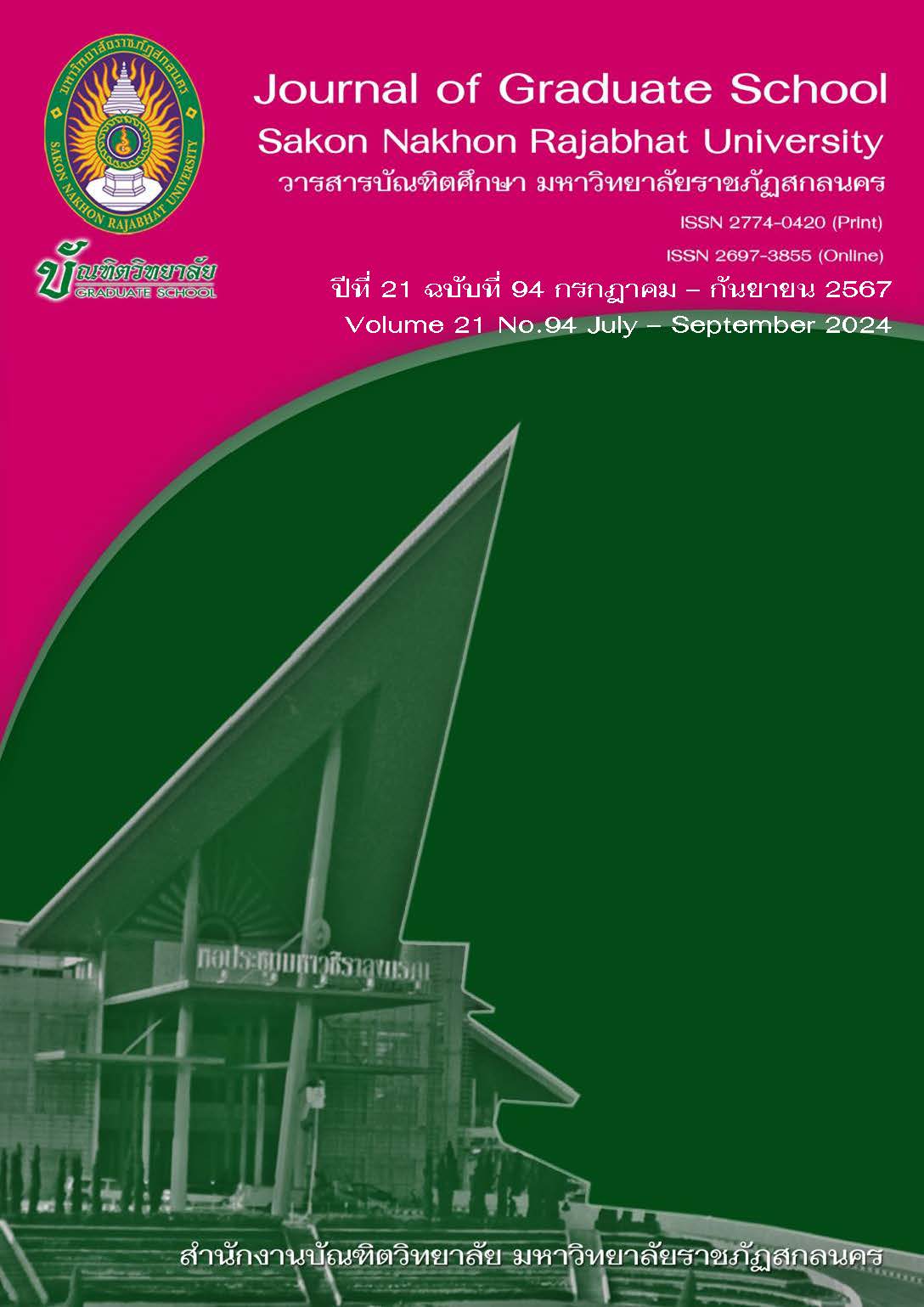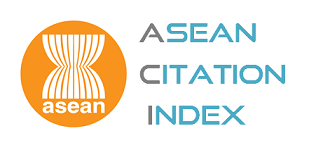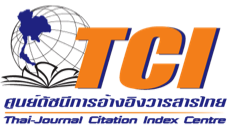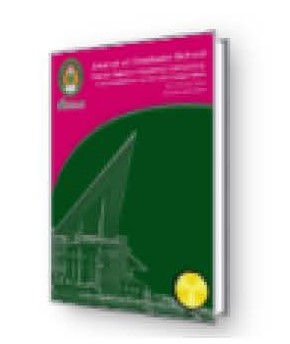DEVELOPMENT OF ACADEMIC ADMINISTRATION STRATEGY TO PROMOTE LEARNING MANAGEMENT COMPETENCY BASED ON COMPETENCY–BASED CURRICULUM OF PRIMARY SCHOOL TEACHERS UNDER THE OFFICE OF BASIC EDUCATION COMMISSION
Keywords:
Academic Administration Strategy, Learning Management Competency, Competency–Based CurriculumAbstract
This research aimed to 1) develop academic administration strategies to promote learning management competency based on a competency–based curriculum; and 2) validate the academic administration strategies to promote learning management competency based on a competency–based curriculum. This mixed–methods research was divided into two phases: Phase 1 involved the development of academic administration strategies to promote learning management competency based on a competency–based curriculum. The key informants consisted of primary school directors, supervisors, and scholars in educational administration, totaling seven individuals, obtained through purposive sampling. Data were collected through interview forms and analyzed using content analysis. The research sample comprised 127 schools under the Office of the Basic Education Commission, participating in a research project focused on the development process of the competency–based curriculum of education sandbox schools during the academic year 2023. These schools were selected through proportional stratified random sampling, distributed by province. The informants, comprising 381 school directors, heads of academic departments, and teachers, completed a set of questionnaires, with item objective congruence indexes ranging from 0.60 to 1.00, the discrimination power between 0.50 and 0.95, and the reliability of 0.99. Data were analyzed for frequency, percentage, mean, standard deviation, and a modified priority need index. The strengths, weaknesses, opportunities, and threats were analyzed by the 2S4M model, PEST model, and TOWS Matrix. Phase 2 involved the validation of academic administration strategies to promote learning management competency based on a competency–based curriculum. The 12 informants, obtained through purposive sampling, included the Director of the Primary Educational Service Area Office, school directors, deputy directors in academic affairs, scholars in educational administration, and supervisors. Data were collected through a connoisseurship seminar and analyzed using content analysis. The strategies were implemented in a primary school and were selected through purposive sampling based on the established criteria.
The research results showed that:
1. The academic administration strategy to promote learning management competency based on a competency–based curriculum consisted of six main strategies: 1) adjusting the innovation and technology development system to align with social and cultural conditions and respond to learners’ needs; 2) developing a competency–based curriculum following modern technologies and addressing learners’ needs; 3) adjusting budgeting system to support the effective development of a competency–based curriculum; 4) upgrading the quality of educational supervision based on a competency–based curriculum; 5) developing technology–oriented learning innovations that respond to learners’ needs; and 6) developing a comprehensive assessment system based on a competency–based curriculum.
2. The academic administration strategy to promote learning management competency based on a competency–based curriculum was approved by consensus that it was accurate, appropriate, feasible, and beneficial.
References
กระทรวงศึกษาธิการ. (2566). ประกาศกระทรวงศึกษาธิการ เรื่อง นโยบายและจุดเน้นของกระทรวงศึกษาธิการ ประจำปีงบประมาณ พ.ศ. 2566. กรุงเทพฯ: กระทรวงศึกษาธิการ.
เกรียงศักดิ์ เจริญวงศ์ศักดิ์. (2546). การคิดเชิงกลยุทธ์. กรุงเทพฯ: ซัคเซสมีเดีย.
จรุณี เก้าเอี้ยน. (2557). เทคนิคการบริหารงานวิชาการในสถานศึกษา: กลยุทธ์และแนวทางปฏิบัติสำหรับผู้บริหารมืออาชีพ. ยะลา: มหาวิทยาลัยราชภัฏยะลา.
จิติมา วรรณศรี. (2557). การบริหารงานวิชาการในสถานศึกษา. พิษณุโลก: รัตนสุวรรณการพิมพ์.
จิรารัตน์ กระจ่างดี. (2562). การศึกษากลยุทธ์การบริหารงานวิชาการของโรงเรียนขยายโอกาสในอำเภอขุนยวม จังหวัดแม่ฮ่องสอน.วิทยานิพนธ์ ค.ม. เชียงใหม่: มหาวิทยาลัยราชภัฏเชียงใหม่.
เฉลิมชัย พันธ์เลิศ. (2562). พัฒนาการหลักสูตรและการจัดการเรียนการสอน: จากอดีตสู่ยุคเปลี่ยนผ่านสู่หลักสูตรฐานสมรรถนะ (Competency). ใน รายการผลงาน สื่อ สิ่งพิมพ์ ประชาสัมพันธ์ และเผยแพร่กรอบสมรรถนะผู้เรียนระดับการศึกษาขั้นพื้นฐาน. เข้าถึงได้จาก https://www.thaiedreform.org/wpcontent/uploads/2019/08/Core_competency09.pdf/. 15 มีนาคม 2566.
ตรีสุคนธ์ คูนาเอก. (2563). แนวทางพัฒนาการบริหารงานวิชาการในโรงเรียนขนาดเล็ก สังกัดสำนักงานเขตพื้นที่การศึกษามัธยมศึกษา เขต 24. วิทยานิพนธ์ ศษ.ม. มหาสารคาม: มหาวิทยาลัยมหาสารคาม.
ทิศนา แขมมณี. (2562). 10 สมรรถนะหลัก ปั้นเด็กไทยฉลาดรู้ อยู่ดีมีสุข มีความสามารถสูงและใส่ใจสังคม. กรุงเทพฯ: สำนักงานเลขาธิการคุรุสภา.
ธัชพงศ์ ชอุ่ม. (2563). กลยุทธ์การบริหารงานวิชาการสำหรับสถานศึกษาเอกชนในบริบทสากล. วิทยานิพนธ์ ปร.ด. นครปฐม: มหาวิทยาลัยราชภัฏนครปฐม.
บุญเลิศ เย็นคงคา. (2554). การจัดการเชิงกลยุทธ์. กรุงเทพฯ: วีเจพริ้นติ้ง.
พรรณนิภา ปินตาติ๊บ. (2563). ปัญหาและแนวทางการบริหารงานวิชาการโรงเรียนประถมศึกษา ในอำเภอวังน้ำเย็น สังกัดสำนักงานเขตพื้นที่การศึกษาประถมศึกษาสระแก้ว เขต 1. งานนิพนธ์ ศษ.ม. ชลบุรี: มหาวิทยาลัยบูรพา.
พระราชบัญญัติระเบียบข้าราชการครูและบุคคลากรทางการศึกษา พ.ศ. 2547. (2547). ราชกิจจานุเบกษา, 121(79ก).
รุ่งชัชดาพร เวหะชาติ. (2550). การบริหารงานวิชาการสถานศึกษาขั้นพื้นฐาน. สงขลา: ศูนย์หนังสือมหาวิทยาลัยทักษิณ.
ลักษณ์ประภา สุวรรณสมบัติ. (2565). การบริหารงานวิชาการของผู้บริหารที่ส่งผลต่อประสิทธิภาพสถานศึกษาตามแบบชีวิตวิถีใหม่ สังกัดสำนักงานเขตพื้นที่การศึกษาประถมศึกษาจันทบุรี เขต 1. วิทยานิพนธ์ ค.ม. จันทบุรี: มหาวิทยาลัยราชภัฏรำไพพรรณี.
ศศิกานต์ เจริญดี. (2544). การศึกษาการทำงานเป็นทีมของผู้บริหารโรงเรียนประถมศึกษา. วิทยานิพนธ์ ศษ.ด. ขอนแก่น. มหาวิทยาลัยขอนแก่น.
สมยศ นาวีการ. (2545). การบริหารเชิงกลยุทธ์. กรุงเทพฯ: มหาวิทยาลัยธรรมศาสตร์.
สันติ บุญภิรมย์. (2552). การบริหารงานวิชาการ. กรุงเทพฯ: บุ๊คพ้อยท์.
สำนักงานคณะกรรมการการศึกษาขั้นพื้นฐาน. (2554). เอกสารการประชุมวิชาการพัฒนาศึกษานิเทศก์แนวใหม่ เล่ม 1. กรุงเทพฯ: ศูนย์พัฒนาการนิเทศเร่งรัดคุณภาพการศึกษาขั้นพื้นฐาน.
สำนักงานเลขาธิการสภาการศึกษา. (2564). กรอบสมรรถนะหลักของผู้เรียนระดับการศึกษาขั้น พื้นฐาน. กรุงเทพฯ: บริษัท พริกหวานกราฟฟิค จำกัด.
สุพานี สฤษฎ์วานิช. (2553). การบริหารเชิงกลยุทธ์ : แนวคิดและทฤษฎี. กรุงเทพฯ: โรงพิมพ์มหาวิทยาลัยธรรมศาสตร์.
อรนุช มั่งมีสุขศิริ. (2562). การวิจัยและพัฒนานวัตกรรมการจัดการเรียนรู้เพื่อพัฒนาคุณลักษณะและทักษะของนักประดิษฐ์. กรุงเทพฯ: สำนักงานคณะกรรมการการจัดการศึกษาขั้นพื้นฐาน.
Certo, S. C. (1988). Instructor's manual for strategic management: concepts and applications. Theoretical support material (Vol. 1): Random House Business Division.
David, F., & David, F. R. (2016). Strategic management: A competitive advantage approach. concepts and cases: Pearson–Prentice Hall.
Higgins, J. M., & Vincze, J. W. (1993). Strategic management: Text and cases. Harcourt School: Dryden Press.
Levine, E., Patrick, S. (2019). What Is Competency-Based Education? An Updated Definition. Aurora Institute.
Likert, R. (1967). “The Method of Constructing and Attitude Scale,” in Attitude Theory and Measurement. New York: Wiley & Son.
Smith, E. W., Krouse, S. W., & Atkinson, M. M. (1961). The educator's encyclopedia: New Jersey: Prentice-Hall.
Thompson Jr, A. A., & Strickland III, A. J. (2003). Strategic management: Concepts and cases. UK: Mcgraw-Hill College.
Downloads
Published
How to Cite
Issue
Section
License
Copyright (c) 2024 Journal of Graduate School Sakon Nakhon Rajabhat University

This work is licensed under a Creative Commons Attribution-NonCommercial-NoDerivatives 4.0 International License.
บทความทุกบทความที่ตีพิมพ์ในวารสารบัณฑิตศึกษา มหาวิทยาลัยราชภัฏสกลนคร ถือว่าเป็นลิขสิทธิ์ของบัณฑิตวิทยาลัย มหาวิทยาลัยราชภัฏสกลนคร










